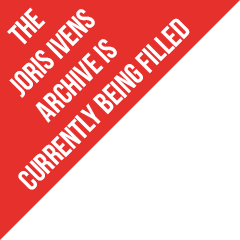

After Joris Ivens made Indonesia Calling (1946) he was immedialtely accused of anti-Dutch propapaganda. Officers of the Secret Service also immediately proposed to withdraw Ivens'passport. Not in 1951, but already in 1945. In a new documentary Selling a Colonial War filmmaker In-Soo Radstake casts a broad view of perpectives, among others a remarkable view of former Dutch minister of foreign affairs Ben Bot. He confirms that it was the Dutch government itself which used pure propaganda, censorship and concealing language to disinform or not inform at all what was really going on in Indonesia. Gerda Jansen Hendriks, a film historian and specialist in Dutch propgandafilms about the Indonesian fight for independence, states about Indonesia Calling : 'The controversy is actually not about the film itself. It is the person of Ivens. Conservative colonials wanted to take revenge on Ivens, becase he was regarded as a threat to their position.' Next to footage of Joris Ivens's film and an excerpt of an interveiw with him about the film also Anthony Liem is filmed. In Sydney he testifies of the support his father-in-law Fred Wong gave to the strike of the harbour workers and to the production of the film. 
This splendid documentary provides an excellent oversight of the complex political and historical processes of the Dutch decolonisation process. Already in 1949 the Dutch government knew about the war crimes committed by the Dutch army. It was Cornelis van Rij, a former member of the resistance and lawyer, who investigated three exemples of such violent acts in 1949, but his clear juridical conclusions were covered by the government and not made public.
According to In-Soo Radstake everybody on both sides were victims, and suffered from pain and bitter disappointment. It is remarkable however that in the national debate, and also in this documentary, the highest political responsible figure of these war crimes, prime-president Louis Beel, is never mentioned. His nickname was not without reason 'the Sphynx'.
The film Sellling a Colonial War was premiered at IDFA and can now be seen in Dutch cinemas (January 2024). 
The power of representation is demonstrated clearly in the way the Dutch government chose to present the Indonesian War of Independence and its violent aftermath (1945-1950). Three quarters of a century on, competing perceptions of the events still remain. Filmmaker In-Soo Radstake casts a broad view as he investigates a multitude of perspectives, including those of the Dutch government, servicemen in the Dutch and the Royal Netherlands East Indies armies, Indonesian independence fighters, the international community and several population groups in the former Dutch East Indies. The Bersiap killings, a neglected episode in which specific groups of citizens were collectively considered as enemies of the revolution, is among the subjects touched upon.
Extensive interviews with international experts provide insight in the complex relationships in the former colony and the global context. Archive footage—some of which has only been discovered decades after the events—not only tells a story of decolonization but also chronicles our dealings with the past.